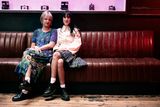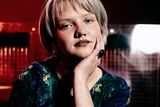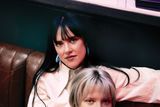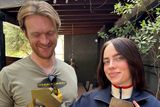Meet the Moncrieff sisters: ‘Our parents’ divorce strengthened our relationship – it unifies you’
With an ever-growing online following, siblings Keelin and Saoirse Moncrieff are using their platform to promote alcohol-free social opportunities for Generation Z. Here, they talk about creating boundaries, vlogging the birth of Keelin’s daughter and growing up with a well-known father





When Keelin Moncrieff was pregnant, she became “obsessed” with watching RTÉ’s The Rotunda and One Born Every Minute.
Keelin is a writer, podcaster and influencer with 85,000 subscribers on YouTube, 104,000 followers on Instagram and 108,000 followers on TikTok. The 26-year-old became pregnant after lockdown when she was living in London, and shared much of her pregnancy journey with her followers. So she decided to vlog her way through her daughter’s birth.
For many people, that may seem like a perplexing thing to do. After all, it’s a very intimate moment of your life to upload and share with strangers on the internet. “I probably won’t do it again,” she says, laughing loudly. “I wanted to show not just the medical sense but actually advocating for yourself.”
Keelin Moncrieff. Photo: Kyle Sven
Her younger sister, 21-year-old Saoirse, chimes in, “I think it’s a great video.”
“I love that video. I think it’s one of my favorites,” Keelin says. “It is so emotional. Now I’ve done that once, now I know I can keep things private and sacred for myself. But I do think that was an important video to have because it gives a different perspective and aspect to birth. The reason why people are so scared is because it’s unknown and you haven’t done it before. So I wanted to actually have the before, you know, the shitting yourself beforehand and all that.”
“And shitting yourself during,” Saoirse, who is sitting beside on a sofa in the bar a Dublin hotel, says.
Keelin laughs. “All the shit... Anyway, I’m glad that I have that documented as well. I’ve learned so much from that experience. If I wasn’t posting all this on the internet, I wouldn’t have met all my mam friends.”
The two sisters are speaking with me as they currently are on a bit of a mission: to host creative events, such as gigs, book swaps and friend speed dating, where young Irish people can meet and socialise. The siblings recently hosted and performed in a concert for Gaza with proceeds going to Doctors Without Borders.
Keelin does most of the organising and acts as an MC while Saoirse sings. An artist and musician, she performs under the name Baby Lemonade — inspired by the Syd Barrett track.
Dublin is not always an enticing place for younger generations to hang out; it’s expensive and more and more venues and cultural spaces seem to be closing down. According to campaign group Give Us The Night, there were 522 nightclubs in Ireland in 2001. Earlier this year, Minister Helen McEntee estimated that number now stood at 70.
“It can be depressing. It feels like you’re just giving, giving, giving, giving — and not getting anything back,” Saoirse says.
Keelin and Saoirse Moncrieff. Photo: Kyle Sven
According to 2023 Eurostat figures, Ireland has one of the youngest populations in the EU but Generation Z often talk about feeling unsupported here. “Especially with our generation, a lot of people are emigrating,” Keelin says. “So it can kind of feel like there’s no young people left. Whereas there are a lot of young people that want to try to create a life here, even though it feels like we’re getting constantly rejected and pushed out.”
Keelin and Saoirse Moncrieff - Homelessness video
She says there are opportunities here, “You just have to create them for yourself,” and the siblings’ aim is to create a space where people can “have fun, outside of drinking”.
“That’s the motivation,” Saoirse says. “It’s like, ‘Oh, this is so shit. There’s nothing to go to.’ But then there’s a space for you to make it yourself, which is kind of more fun.”
The two sisters have an extremely close relationship and are astute and talkative. They grew up in Dublin with their elder brother, and middle sister Ellie — who they describe as an academic. They also have a younger half sister.
Many readers will know their father, the Newstalk broadcaster Seán Moncrieff. I ask what it was like growing up with a dad in the public eye. In her adolescence, Saoirse found it quite entertaining.
I was at my granddad’s funeral and someone asked my dad for a picture. That was really bad. That was my first experience that people have no boundaries
“I thought it was really cool when I was younger,” she says. “I like saying it in taxis because the taxi men love it. I like throwing in little hints and then they go, “Is your father Seán Moncrieff? Which daughter are you?”
But there were also times when people crossed a line. “I do remember I was at my granddad’s funeral and someone asked my dad for a picture,” Keelin says. “That was really bad. That was my first experience that people have no boundaries.”
In adult life, Keelin says having a well-known parent is not always a positive, “just because of the association, the nepotism”. She says people can sometimes assume her success is a result of her father. “It will always be, ‘Well, she got that because of her dad,’ rather than the platform that I have. Which is fine. I can accept that.”
Read more
However, she says it can be frustrating as the majority of her followers are from the UK. “And they haven’t a clue who he is so it doesn’t make any sense. It is just something I will have to deal with unless I change my second name.”
Keelin started exploring social media and building up an online presence when she was studying fashion buying in Portobello Institute in Dublin. She watched a documentary called The True Cost, which showed the impact fast fashion was having on the planet, and began making videos on this topic. People watched and started following her. She likes creating content that is informative but doesn’t feel “like a lecture”.
“That is what put the fire under my belly,” she says.
For Keelin, making these videos felt very natural. “I probably was influenced by my dad. I just thought that was the norm. You know, producing things and speaking to people and performing.”
Saoirse and Keelin Moncrieff. Photo: Kyle Sven
Since then, her channels have grown substantially, with thousands of people following her. She says she was confident and driven from a young age. She went to the famous Billy Barry Stage School in Dublin and wanted to succeed in school and college, and obtain a PhD.
When she mentions this, Saoirse rolls her eyes and teasingly cries, “Laame!” Saoirse found the academic structure harder to navigate.
“I don’t work well in those environments at all,” she says. “I stopped going to school consistently when I was in fifth class. I would hide in the wardrobe. I was so sad in my adolescence because I hated going to school. It just didn’t suit me.”
She says there can be a misconception that, when people leave school, it indicates a lack of ambition or direction. For her, this was not the case. “There were so many avenues I wanted to go down.” Her parents, she says, were supportive of her decision. “I [was like], this is me and you actually have to kind of deal with this or else I’m just going to be like crying all the time… it [was] unbearable,” she says. “I can’t do it. Like my body won’t let me.”
Saoirse has a less substantial following than Keelin but there is a similarity in some of the content they share. It is not your typical high-gloss and perfectly manicured Insta grid. Their vlogs are honest, and offer evocative vignettes into their lives. The topics are varied: music, relationships, art, parenthood. Do they ever share anything and suffer from ‘poster’s remorse’?
Saoirse is reluctant to use the word regret but admits she would be more selective nowadays about the things she shares. “At the time, it was good. I would post [on YouTube] really vulnerable videos of me crying, me talking about my feelings, whatever, and it helped a lot of people. [But] there was no privacy. I had a boyfriend at the time and it shone a light on that relationship. When [the relationship] ended, everyone kept going on about it, and I deleted all of those videos.”
I was trying to rebel against the whole ‘everything has to be private’. I wanted to just completely expose myself. It was kind of self-sabotage
She says, every few months, she will watch one of her own videos, and find a line too revealing and take it down. “My whole thing was like I was trying to rebel against the whole ‘everything has to be private’. I wanted to just completely expose myself. It was kind of self-sabotage a little [bit]. I was trying to sabotage my reputation to make a statement. To be like, ‘it doesn’t matter because everyone’s the same’.”
The intention was to encourage others to be more vulnerable but, these days, she says, she has moved away from that sort of content.
“I don’t do that anymore, because it’s just not my buzz. I’m expressing myself in more of an abstract way. It’s more like artistic videos. Maybe I will go back… Obviously I don’t regret anything.”
But she says some earlier videos make her wince slightly. “Because I was 17. I was a child, and, I’m like, completely different and have changed so much.”
For Keelin, she has learnt over time what her boundaries are. She used to think that “because [my followers] were watching me and supporting me that I needed to give them my everything and open up all of me. Whereas now, there are obviously some things I can keep private and I don’t care anymore.”
When she had her daughter, she made the decision not to reveal her name, or share images of her face online. At the time, she said there were multiple reasons for this: her daughter didn’t sign up to it, and the internet is still in its infancy and there is “not really any information on how you can protect a child’s privacy or boundaries”.
The decision irritated some people.
“That was a shock,” she says. “People were very invasive with that sort of thing. That was a bit horrible.”
Do negative comments and criticism ever get too much?
“Sometimes. It depends how sensitive I am, I suppose,” Keelin says. “Sometimes I would engage. But, the majority of time, I do have to discern between whether something is genuine criticism or someone who just wants to be hateful for being hateful.”
She points out that the vast majority of the feedback is positive. And while some of the comments can be hurtful, she also finds them helpful.
“I feel like people are shocked when I say this but I am actually grateful for it, like some hate. Because, if you think about it, hundreds of people saying they love you and you’re gorgeous 24/7 is going to be harmful.
“It’s one negative comment out of a hundred but obviously that is going to get a visceral reaction out of me because it’s something negative, but also it’s testing my character because I shouldn’t be going, ‘Well, all these people love me.’ Because then I know I’ve lost myself. Total egomaniac. So I do actually appreciate it. And sometimes it is genuine criticism because I can say things that are wrong. Because I’m a person, you know, I’m not a robot. I’m not Siri or Alexa… So I do appreciate it sometimes.”
However, there are moments that have caused real concern when people have taken things too far.
“My address has been posted on the internet. And there’s a few times where I’ve been near pressing charges,” she says. “It really gets intense. People don’t have boundaries when it comes to the internet. But again, all the positives out of my job like vastly outweigh it.”
Keelin recently appeared on Prime Time talking about the housing crisis and how difficult it is to find a place to live in Ireland. She makes a comfortable salary from social media but, like many people, becoming a homeowner feels out of reach.
“I should be able to have a life in Ireland. It’s not even about Dublin anymore,” she says. “I should be able to have a life in any other county in Ireland and be able to have a car and to be able to send my daughter to the Gaeltacht in the summer. But it’s like it’s getting more and more difficult for people to have a life outside of just paying their bills and surviving.”
She is planning on moving to Northern Ireland with her daughter as housing is more affordable there, and renting in Dublin is too precarious.
Saoirse Moncrieff. Photo: Kyle Sven
“I keep thinking about security and the future, which is basically at the forefront of my mind. I didn’t actually think it was going to be this bad. Maybe I’m naive or just stupid. But I genuinely thought if I save enough, I’ll be able to afford a house. I’m just under so much pressure and I want to have a garden for my daughter and for her to have friends in the estate or be able to go to school and know that we’re not going to have to move at the end of the year.”
Saoirse is still living at home with Ellie and her mother. Keelin admits being apart from her sisters would be difficult if and when she moves, but says, “You can’t have it all.”
They believe their sisterly bond strengthened around the time of their parents’ separation when they were 14 and nine respectively.
“It unifies you. I listened to a podcast on it before about the psychological effects of divorce and apparently it does actually bring siblings closer together. So I suppose it just strengthened our relationship after that happened,” Keelin says. “They are my best friends.”
Saoirse adds, “Because our parents were going through a lot, Keelin really helped me, and took care of me. And I see her as such a mother figure for me. My parents are my parents too, and I love my parents, but I love all my siblings like mothers and fathers.”
She says both her sisters take care of her “in a very practical way”.
“They pay for everything, they push me to do things… even if I surpass them financially, I think they’d still be paying for shit,” she says.
I ask what their ambitions are for the future. Saoirse is getting a band together and wants to continue to create art. She says her influences are Bob Dylan and Leonard Cohen and “their kind of poetry. [In terms of musical style], I wouldn’t say I am going for anything in particular because I’m so like flimsy,” she says. “I change my mind every day [and] like to dip my foot in everything.”
Keelin wants to write a novel and screenplay which she would like Saoirse to direct.
At one stage, as Keelin talks about ambition and the importance of being forthright, Saoirse cuts in remarking on her sister’s confidence.
“Keelin just doesn’t understand insecurity,” she says. “I literally am so insecure. Even if I have a crush on someone, she’s like, ‘Literally show up to their house and ask them to be with you.’ I’m like, ‘No.’”
Keelin tried to explain this self-assurance.
“I only have so many years, so why am I getting in my own way?” she says. “Imagine yourself being your own obstacle — it’s such a waste of time.”
Keelin and Saoirse Moncrieff’s next Self Care Club takes place on May 29 in Pawn Shop, Dublin. Their Woman Loves Woman And Queer Friends Even Friends of Dorothy event takes place on June 13, also in Pawn Shop, and includes open-mic poetry, bands and an all female DJ set
Hair and make-up: Brown Sugar
Join the Irish Independent WhatsApp channel
Stay up to date with all the latest news

















